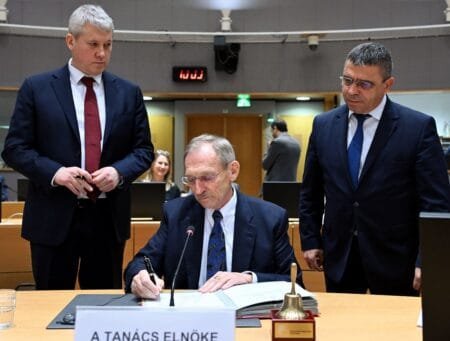The European Commission presented on 24 November an action plan on Integration and Inclusion for the period 2021-2027.
Advertisement
What are the main challenges for newcomers when they move to the EU?
Migrants and EU citizens with a migrant background often face challenges in terms of discrimination and inequality in education, employment, healthcare and housing. Learning a new culture, language, social norms are also challenges that newcomers contend with while integrating into European societies and labour markets.
While the coronavirus pandemic has impacted all our lives, people with a migrant background can be particularly exposed to the coronavirus due to higher incidence of poverty, overcrowded housing conditions and working in jobs where physical distancing is difficult.
How is this action plan different from the 2016 action plan on integration?
The new action plan builds on the achievements of the 2016 action plan and goes further by bringing forward new actions and a stronger framework to promote integration and inclusion, focusing on the essentials of successful integration and inclusion into a host society: education and training, employment and skills, health and housing.
The plan also addresses cross-cutting issues such as: fostering partnerships between key integration players, tackling racism and discrimination, maximising the use and impact of EU funding for integration and inclusion, promoting the active participation of migrants and EU citizens with a migrant background in host societies, using digital tools and monitoring progress while designing integration and inclusion policies based on reliable evidence. The plan also takes into account the specific needs of different groups, including EU citizens with a migrant background, women, religious minorities, and for persons with disabilities, for example.
How does the action plan support better links between host communities and migrants?
Empowering both people with a migrant background and host communities to actively engage in the integration process is essential to achieve sustainable and successful integration. The action plan will support local communities by: building capacity of local and regional authorities to involve local communities in the design and implementation of integration measures and programmes, financing projects to promote volunteering actions co-designed by people with a migrant background and host communities, and promoting mentoring and buddy programmes between local communities and newcomers. An integration award for schools, local communities, artistic and cultural organisations, and sports and youth clubs will make their contribution to integration and inclusion more visible. These actions will also help newcomers take their responsibilities in strengthening links with the host society.
What has the EU done in the field of integration so far?
While Member States are primarily responsible for implementing social policy (such as integration and inclusion), the EU has supported integration actions through dedicated funding through the Asylum, Migration and Integration fund, the European Social Fund, the European Regional Development Fund, Erasmus+ and other funds. In 2016, the Commission adopted an action plan on the integration of third country nationals, which contained 50 actions to promote integration in several fields. Following the adoption of the 2016 action plan, the Commission created the European Integration Network to promote exchanges and mutual learning between national authorities in charge of integration. The new action plan is accompanied by a Staff Working Document which assesses the 2016 action plan, including some of the most impactful and relevant actions carried out since 2016.
What is the role of the Commission in implementing integration and inclusion policies?
While Member States are responsible for implementing integration and inclusion policies, the EU and the Commission in particular play a fundamental role in supporting the Member States and other key actors such as local and regional authorities. This support comes through various forms ranging from funding (European Regional Development Fund, European Social Fund Plus, Asylum and Migration Fund, Erasmus+, Invest EU and the upcoming Citizens, Equality, Rights and Values programme), developing guidance and practical tools, coordination, monitoring and fostering partnerships at local and national level.
Why mainstream gender and anti-discrimination into integration and inclusion and how is this achieved?
People experience discrimination differently based on their gender, age, religious background, or ethnicity or a combination of these factors. People with a migrant background are a diverse group, which means mainstream policies should be adapted and transformed to support their different needs. Making policies more inclusive overall will be achieved through creating close synergies with existing and upcoming EU strategies to foster equality and social cohesion to ensure everyone is fully included and participates in European societies. In particular, it will be implemented in close interaction with the forthcoming action plan to implement the European Pillar of Social Rights and the EU’s anti-racism action plan. It will also build synergies with the EU Roma strategic framework for equality, inclusion and participation; the LGBTIQ equality strategy 2020-2025 , the forthcoming strategy to combat antisemitism and the EU citizenship report.
On what evidence is the plan based?
The proposed actions are based on lessons learned from the 2016 action plan on the integration of third country nationals, as well as on consultations conducted by the Commission between June and October 2020 among a wide range of actors. These include a public consultation as well as targeted consultations with Member States, local and regional authorities, social and economic partners, employers, civil society organisations, foundations, international organisations, migrants and refugees. Furthermore, the action plan is based on evidence and data collected through a wealth of recent research and studies conducted by the Commission in this field, for instance the 2018 Eurobarometer on integration, reports by the Knowledge Centre on Migration and Demography as well as a OECD-EU joint report on integration indicators.
What is the EU doing to ensure that migrant communities are consulted in the policies that concern them?
Consulting people on the design and implementation of policies that directly impact them is essential to both effective policy making and to encouraging public participation in EU decision-making. For this reason, the Commission launched an Expert group on the views of migrants, made up of people with a migrant background and organisations representing the migrants’ interests. The group will take an active part in the design and implementation of EU policies related to integration, migration and asylum. The first meeting of the group took place on 12 November this year and contributed to the development of the action plan.
What benefits does integration of people with a migrant background bring to our economy?
As shown by recent research by the Joint Research Centre, fully integrating migrants and EU citizens with a migrant background into the labour market could generate large fiscal gains. People born in the EU generally make a higher fiscal contribution in comparison to people born outside of the EU. This situation is likely to reverse in the near future, partly due to European ageing population. Moreover, if non-EU-born inhabitants had similar labour market participation and wages as EU-born, the per capita net fiscal contributions for the average non-EU migrant in 2035 would increase by up to 3,500 euros.
What are the next steps for the action plan?
The Commission will monitor the implementation of the actions put forward in the plan and conduct a mid-term review at the end of 2024. The Commission will develop an interactive online platform, which will be hosted on the European Website on Integration, to monitor progress and allow for contributions from a wider range of partners. The Commission will also regularly report to the European Parliament and the Council.
Action plan on Integration and Inclusion 2021-2027 – background guide
Source: European Commission





